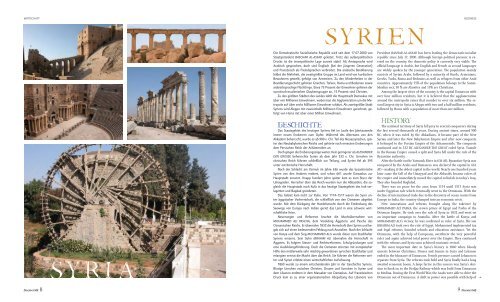Download gesamte Ausgabe - Discover ME
Download gesamte Ausgabe - Discover ME
Download gesamte Ausgabe - Discover ME
Erfolgreiche ePaper selbst erstellen
Machen Sie aus Ihren PDF Publikationen ein blätterbares Flipbook mit unserer einzigartigen Google optimierten e-Paper Software.
Wirtschaft<br />
Pictures by: Volker Scheller<br />
<strong>Discover</strong> <strong>ME</strong> 8<br />
Syria<br />
Die Demokratische Sozialistische Republik wird seit dem 17.07.2000 von<br />
Staatspräsident BAschAr Al-AssAd geleitet. Trotz des außenpolitischen<br />
Drucks ist die innenpolitische Lage zurzeit stabil. Als Amtssprache wird<br />
Arabisch gesprochen, doch sind Englisch (bei der jüngeren Generation)<br />
und Französisch als Fremdsprachen verbreitet. Die arabische Bevölkerung<br />
bildet die Mehrheit, die zweitgrößte Gruppe im Land wird von kurdischen<br />
Bewohnern gestellt, gefolgt von Armeniern. Zu den Minderheiten in der<br />
Bevölkerungsschicht gehören Griechen, Türken, Roma und Beduinen sowie<br />
arabischsprachige Flüchtlinge. Etwa 75 Prozent der Einwohner gehören der<br />
sunnitisch-muslimischen Glaubensgruppe an, 15 Prozent sind Christen.<br />
Zu den größten Städten des Landes zählt die Hauptstadt Damaskus mit<br />
über vier Millionen Einwohnern, wobei man die Agglomeration um die Metropole<br />
auf über sechs Millionen Einwohner schätzt. Als zweitgrößte Stadt<br />
Syriens wird Aleppo mit zweieinhalb Millionen Einwohnern gerechnet, gefolgt<br />
von Homs mit über einer Million Einwohnern.<br />
Geschichte<br />
Das Staatsgebiet des heutigen Syriens fiel im Laufe der Jahrtausende<br />
immer neuen Eroberern zum Opfer. Während des Altertums von den<br />
Akkadern beherrscht, wurde es ab 900 v. Chr. Teil des Neuassyrischen, später<br />
des Neubabylonischen Reichs und gehörte nach erneuten Eroberungen<br />
dem Persischen Reich der Achämeniden an.<br />
Doch gingen die Eroberungszüge weiter. Kein geringerer als AlexAnder<br />
der Grosse beherrschte Syrien ab dem Jahr 332 v. Chr. Unruhen im<br />
römischen Reich führten schließlich zur Teilung, und Syrien fiel ab 395<br />
unter oströmische Herrschaft.<br />
Nach der Schlacht am Yarmuk im Jahre 636 wurde das byzantinische<br />
Syrien von den Arabern erobert, und schon 661 wurde Damaskus zur<br />
Hauptstadt ernannt. Knapp hundert Jahre später kam es zum Sturz der<br />
Umayyaden. Herrscher über das Reich wurden nun die Abbasiden, die sogleich<br />
die Hauptstadt nach Kufa in das heutige Staatsgebiet des Irak verlagerten<br />
und Bagdad gründeten.<br />
Das Gebiet kam nicht zur Ruhe. Von 1174–1517 waren die Syrer unter<br />
ägyptischer Vorherrschaft, die schließlich von den Osmanen abgelöst<br />
wurde. Mit dem Rückgang der Handelsmacht durch die Entdeckung des<br />
Seewegs von Europa nach Indien geriet das Land in eine schwere wirtschaftliche<br />
Krise.<br />
Neuerungen und Reformen brachte die Machtübernahme von<br />
MohAMMed Ali PAschA, dem Vizekönig Ägyptens und Pascha des<br />
Osmanischen Reichs. Er übernahm 1832 die Herrschaft über Syrien und begab<br />
sich auf einen bedeutenden Feldzug nach Anatolien. Nach der Schlacht<br />
von Konya und dem Sieg MohAMMed Alis wurde dieser zum Stadt halter<br />
Syriens ernannt. Sein Sohn iBrAhiM Ali übernahm die Herrschaft in<br />
Ägypten. Es folgten Steuer- und Rechtsreformen, Schulgründungen und<br />
eine Ausbildungsförderung. Doch die Osmanen stürzten mit europäischer<br />
Hilfe den mittlerweile sehr mächtig gewordenen syrischen Stadthalter und<br />
erlangten erneut die Macht über das Reich. Sie führten die Reformen weiter<br />
und Syrien erlebte einen wirtschaftlichen Aufschwung.<br />
1860 wurde zu einem entscheidenden Jahr in der Geschichte Syriens.<br />
Blutige Unruhen zwischen Christen, Drusen und Sunniten in Syrien und<br />
dem Libanon endeten in dem Massaker von Damaskus. Auf französischen<br />
Druck kam es zu einer organisatorischen Abspaltung des Libanons von<br />
Syrien<br />
business<br />
President Bashar al-assad has been leading the democratic-socialist<br />
republic since July 17, 2000. Although foreign political pressure is exerted<br />
on the country, the domestic policy is currently very stable. The<br />
official language is Arabic, but English and French as second languages<br />
are widely spoken by the younger generation. The population mainly<br />
consists of Syrian Arabs, followed by a minority of Kurds, Armenians,<br />
Greeks, Turks, Roma and Bedouins as well as refugees from other Arab<br />
countries. Approximately 75% of the population belongs to the Sunni-<br />
Muslim sect, 10 % are Alawites and 15% are Christians.<br />
Among the largest cities of the country is the capital Damascus with<br />
over four million residents, but it is believed that the agglomeration<br />
around the metropolis raises that number to over six million. The second<br />
largest city in Syria is Aleppo with two and a half million residents,<br />
followed by Homs with a population of more than one million.<br />
History<br />
The national territory of Syria fell prey to several conquerors during<br />
the last several thousands of years. During ancient times, around 900<br />
BC, when it was ruled by the Akkadians, it became part of the New<br />
Syrian and later the New Babylonian Empire and after new conquests<br />
it belonged to the Persian Empire of the Achaemenids. The conquests<br />
continued and in 332 BC alexander the Great ruled Syria. Tumult<br />
in the Roman Empire caused a split and Syria fell under the rule of the<br />
Byzantine authority.<br />
After the battle on the Yarmouk River in 636 AD, Byzantine Syria was<br />
conquered by the Arabs and Damascus was declared the capital in 661<br />
AD – making it the oldest capital in the world. Nearly one hundred years<br />
later came the fall of the Umayyad and the Abbasids became rulers of<br />
the empire and immediately moved the capital to Kufah in today’s Iraq.<br />
They also founded Baghdad.<br />
There was no peace for the area; from 1174 until 1517 Syria was<br />
under Egyptian rule which eventually went to the Ottomans. With the<br />
decline of international trade due to the discovery of ocean routes from<br />
Europe to India, the country slumped into an economic crisis.<br />
New innovations and reforms brought along the takeover by<br />
MohaMMed ali Pasha, the crown prince of Egypt and Pasha of the<br />
Ottoman Empire. He took over the rule of Syria in 1832 and went on<br />
an important campaign to Anatolia. After the battle of Konya and<br />
MohaMMed ali’s victory, he was confirmed as ruler of Syria. His son<br />
iBrahiM ali took over the rule of Egypt. Mohammed implemented tax<br />
and legal reforms, founded schools and education assistance. Yet the<br />
Ottomans, with the help of Europeans, overthrew the very powerful<br />
ruler and again achieved total power over the Empire. They continued<br />
with the reforms and Syria soon achieved economic revival.<br />
The most important date in Syria’s history is 1860 when bloody<br />
unrests between Christians, Druses and Sunnis in Syria and Lebanon<br />
ended in the Massacre of Damascus. French pressure caused Lebanon to<br />
separate from Syria. The reforms took hold and Syria finally had a long<br />
awaited economic boom. A large factor in this success was Syria’s decision<br />
to hook on to the Hedjaz Railway which was built from Damascus<br />
to Medina. During the First World War, the Arabs were able to drive the<br />
Ottomans out of Damascus. A shift in power was possible with help of →<br />
9 <strong>Discover</strong> <strong>ME</strong>











